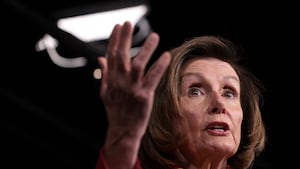Rep. Elaine Luria (D-VA) points the finger at Facebook for its role in spreading disinformation and adding to “divisiveness” in U.S. politics that ultimately led to the Jan. 6 insurrection—an event she has been charged with investigating.
And while Luria may truly want to “hold tech companies accountable,” she also wants tech company holdings in her account.
According to her 2021 financial disclosure, Luria holds between $1 million and $5 million in Facebook (now “Meta”) stock. Those holdings, owned jointly with her husband, make her the largest Facebook shareholder in Congress, and might appear to undercut the force of her criticism.
At a town hall last month, Luria—who sits on the House Select Committee investigating the Jan. 6 insurrection—said it was time to “hold tech companies accountable,” skewering the tech giant for its “amplification of misinformation.”
“I think we should hold tech companies accountable,” Luria said. “I know that Facebook, Twitter, and other tech companies have been asked to testify before Congress about the algorithms, about the implications of them, as well.”
She also connected the platform to the riot, telling the audience that when it comes to “Jan. 6-related issues,” social media has “added to divisiveness in our political rhetoric” and “led ultimately to the events” of the insurrection.
“The spread of disinformation that, you know, led ultimately to the events of, in part to the events of Jan. 6, is really part of our investigation,” she said. “It’s very important to understand the impacts of social media and how the amplification of misinformation online has impacted that.”
And while Luria has never received money from Facebook’s PAC, when it comes to spreading political information, Luria herself frequently turns to the company.
Since her first congressional bid in 2018, Luria’s campaign has paid Facebook $354,540 for advertising, according to data from the Facebook Ad Library. She’s spent as much as $60,000 since Jan. 6, 2021.
(It’s impossible to know from public information exactly how much she spent since Jan. 6. Facebook provides data in ranges and the Luria campaign doesn’t itemize its Facebook expenses, leaving the buys to digital marketers.)
There is, of course, nothing wrong with Luria’s claims about social media’s role in amplifying misinformation and reinforcing beliefs, borne out by years of research. But that open criticism may appear at odds with her private financial interests.
Still, says Kedric Payne, director of ethics at nonpartisan watchdog Campaign Legal Center, these positions don’t necessarily translate into a conflict of interest, given the committee’s work.
“One problem with lawmakers owning stock is the perception of official decisions made to benefit their stock instead of the public,” Payne said. “However, this perception of self-dealing disappears when a lawmaker takes official action that could harm their financial interest.”
Stephen Spaulding, senior counsel for public policy at good government group Common Cause, told The Daily Beast that disclosure rules are valuable precisely for these scenarios.
“Disclosure of Members’ financial holdings is a way for their constituents to evaluate potential conflicts of interest and hold their elected leaders accountable to the public interest. That’s what the transparency concerning Rep. Luria’s financial holdings in Facebook affords the public in this example,” Spaulding said. He added that proposed reforms “ought to be a pillar of consensus” in Congress.
Luria, however, has called proposed bipartisan trading bans “bullshit.”
“I think this whole concept is bullshit. Because I think that, why would you assume that members of Congress are going to be inherently bad or corrupt?” Luria said in a February interview with Punchbowl.
It “makes no sense,” she added, to assume officials will use their positions of power “for some nefarious means or to benefit themselves.”
“So I’m very strongly opposed to any legislation like that,” Luria said.
The Daily Beast reached out to Luria’s office, but did not receive a reply.
The day before Punchbowl ran that interview, House Speaker Nancy Pelosi—who previously opposed a trading ban—appeared to shift her stance, a move that split Luria from not only the vast majority of her Democratic colleagues but House leadership as well.
It’s not just a Democratic issue. Trading ban legislation now has traction in both parties, thanks in large part to high-profile federal investigations into a number of elected officials after news reports revealed shady transactions at the onset of the pandemic. And as that reporting continued to roll out, Republicans began stepping up to propose their own versions.
Last year, Luria reported a net worth of between $3.2 million and $12.4 million, and traded as much as $1 million in late March, including a sale worth between $250,001 and $500,000 in shares of Chinese tech giant Ali Baba. (Congressional data only comes in ranges.)
Luria, a two-term moderate and Navy veteran, has already clinched the Democratic primary for lack of a challenger, but she’s seen as a vulnerable incumbent. Her district, a purple zone that covers most of the Hampton Roads area, was redrawn in December, when it flipped to a 6-point Republican advantage, according to FiveThirtyEight. (The Virginia Supreme Court appointed independent adjudicators to redistrict the state.)
And while neither of her two most likely GOP opponents—state Senator Jen Kiggans and educator Jarome Bell—report holding any individual stocks, Luria is far more likely to clash with them on claims about the 2020 election and subsequent insurrection.
Kiggans, currently the Republican favorite, was one of four Virginia state senators to call for a “forensic audit” of the 2020 results, though she cast that vote in February, about 18 months late.
Bell, a fringe-right MAGA die-hard and conspiracy theorist who recently appeared onstage with ex-President Donald Trump at Mar-a-Lago, has recently polled even more strongly than Kiggans in a head-to-head with Luria. This week, he reiterated his belief that the 2020 election was stolen, and demanded once again to “execute all involved.”
But here, Luria and Facebook appear to align. After the Jan. 6 attack, the company cut off contributions to election objectors, a promise it has so far kept.










